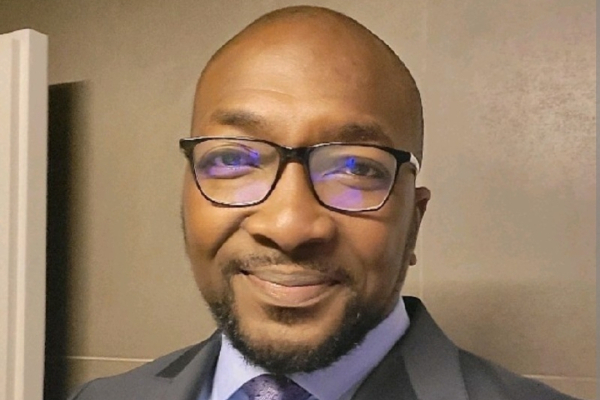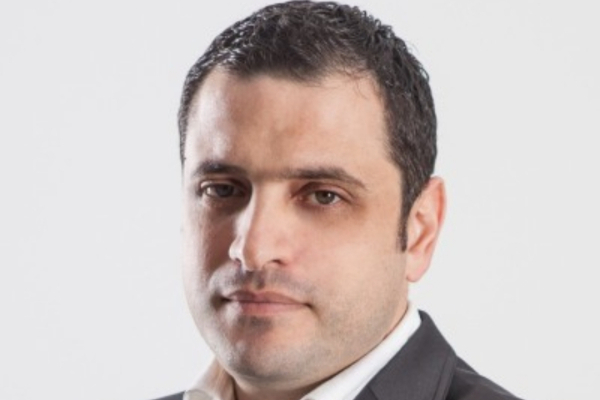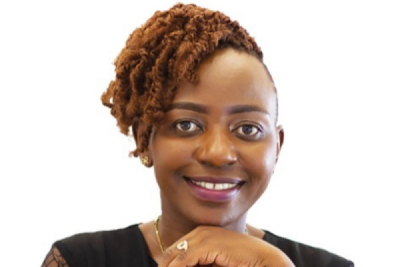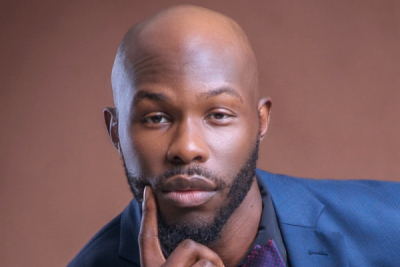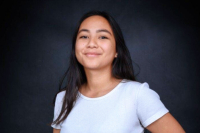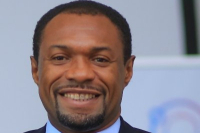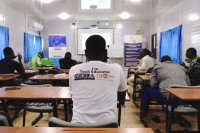
TECH STARS (1007)
A seasoned tech entrepreneur, he specializes in creating innovative solutions to help businesses smoothly complet their digital transformation. He has already worked on hundreds of projects, consistently delivering satisfaction to numerous clients.
Mohamed Sounkere (photo) is an Ivorian tech entrepreneur and an expert in cybersecurity, cloud, and open source technologies, and an Ivorian tech entrepreneur. He is the co-founder and CEO of Veone, a startup that aims to make open source technologies and solutions accessible to businesses.
Founded in 2010, Veone is committed to providing innovative and high-quality IT solutions, leveraging its expertise in software development, integration of open source technologies, and cloud services. The company's stated mission is "to become the trusted partner for businesses, helping them navigate an ever-evolving digital landscape while optimizing their performance and efficiency.”
Veone's expertise spans various technological domains, including application development, big data, enterprise management, artificial intelligence, and automation. Its areas of operation include healthcare, telecommunications, transport and logistics, education, infrastructure, the public sector, and banking and insurance.
To date, the startup has completed over 1,500 projects and mastered more than 500 technologies. Among its flagship innovations are AssurLink and CentralBill. AssurLink is an all-in-one solution designed to optimize all business processes for insurance firms. CentralBill, on the other hand, is designed to modernize and simplify payment and collection processes for large companies and public institutions. This solution received the award for Best Digital Innovation at the 2024 Digital Transformation Awards.
Mohamed Sounkere graduated from Groupe Loko in 2002 with a Higher Technical Certificate (BTS) in Mathematics and Computer Science. In 2005, he earned a degree in Computer Science from Agitel Formation.
His professional career began in 2005 at CIMARKET, an electronic payment startup, where he was an IT security specialist and IT manager. In 2008, he joined Talentys SA, a company specializing in IT security and networks, as a senior technical project manager, working there until 2011.
Melchior Koba
He aims to bring businesses closer to their customers and improve their performance. To achieve this, he is developing a series of technological tools designed to optimize these interactions between the two parties.
Achraf Gabsi (photo) is the founder and CEO of Go Mybiz, a technology startup specializing in providing IT solutions. Originally from Tunisia, Gabsi created this company to strengthen the relationships between businesses and their clients.
Founded in 2020, Go Mybiz offers a suite of customer relationship management (CRM) software, enabling businesses to fully digitize their customer journey. The startup has already developed three key software solutions: Go Voice, Go Contact, and Go Sales.
Go Voice is an advanced business telephony solution offering a wide range of essential features, including an interactive voice response (IVR) system, personalized messages for business hours and queues, detailed statistics, and computer-telephony integration (CTI).
Go Contact is designed for commercial and marketing departments. It helps manage customer service, conduct prospecting campaigns and appointment setting, perform satisfaction surveys, and handle debt collection.
Go Sales is a sales force management tool that provides detailed tracking of opportunities, quotes, and tasks through a configurable sales cycle tailored to the company's internal processes.
In addition to leading Go Mybiz, Achraf Gabsi is a member and secretary-general of TunisianStartups. He also serves as vice-president of the Confederation of Tunisian Citizen Enterprises (CONECT), an innovative organization representing businesses of all sizes across the country.
Achraf Gabsi graduated from the Institute of Higher Commercial Studies of Carthage with a specialized graduate diploma (DESS) in Information Technology and E-commerce in 2002. His career began the same year at Tunisie Voyages, where he was responsible for new information and communication technologies (ICT).
In 2007, he joined Satec, a digital solutions integrator, as a senior account manager for government projects. From 2012 to 2020, he worked at Smarthost, a technology company providing cloud services for SMEs, large enterprises, and government organizations, where he held positions as sales director and CEO.
Melchior Koba
He gained extensive experience in digital marketing by working for several companies in Canada. As an entrepreneur over the past few years, he has simplified the process of exchanging second-hand clothing between buyers and sellers.
Salim Ammara (photo is an Algerian tech entrepreneur. He is the founder and CEO of Dirideal, an e-commerce platform specializing in second-hand clothing. Launched in 2022, Dirideal makes buying and selling clothes from home easy.
The platform created a true circular community with a paperless door-to-door delivery service and an integrated digital wallet. Acting as an intermediary between sellers and buyers, a courier picks up packages from sellers and delivers them to buyers across Algeria. It already boasts 150,000 active users nationwide, offers 17,000 items, and registers 700 new members daily.
In addition to his role at Dirideal, Salim Ammara is also a part-time marketing director for startup companies. His expertise includes analyzing buying behaviors, developing brand images, and optimizing sales promotions to improve profitability and market position.
He holds a marketing degree from the University of Sherbrooke, Quebec, where he earned a bachelor's degree in marketing in 2014. His professional career began in 2013 at Ludis Media in Sherbrooke as a digital marketing strategist. In 2015, he joined SherWeb, a Quebec-based cloud distributor, as a marketing strategist.
In 2018, Salim joined Datavalet Technologies, a Canadian software company, as digital marketing director. The following year, he became a marketing automation consultant at Incloud Business Solutions. Concurrently, he taught digital marketing at the Montreal College of Information Technology. From 2020 to 2021, he served as marketing manager at Bopper, a company helping artists obtain licenses.
With his rich and diverse background, Salim Ammara continues to make significant contributions to technological innovation and the development of e-commerce in Algeria.
Melchior Koba
A finance expert, she leverages technology to create solutions tailored to the financial needs of SMEs and rural populations. Her commitment to combating financial exclusion has earned her numerous awards and distinctions.
Ethel Mupambwa (photo) is the founder and CEO of fintech startup MoneyMart Finance. Born in Zimbabwe, she is driven by the ambition to ensure financial inclusion for all her fellow citizens through her startup.
Founded in 2014, MoneyMart Finance is dedicated to fostering universal positive transformation by providing access to digital financial services. The company offers loans tailored to the activities of informal businesses and small and medium-sized enterprises (SMEs). It also provides micro-insurance solutions for individuals, including funeral financing plans.
MoneyMart Finance tackles various forms of exclusion that contribute to poverty, including energy exclusion. The company is also a distributor of off-grid solar systems, serving families and small businesses needing reliable, sustainable, and clean energy.
Since its inception, MoneyMart Finance has served over 6,000 microenterprises and disbursed more than $5 million in loans. Additionally, it has financed over 1,300 solar systems. Reflecting a development policy focused on empowering women and youth, 70% of its clients are women and 50% are young people.
Ethel Mupambwa serves on the board of directors of the Zimbabwe Association of Microfinance Institutions (ZAMFI). She is also a founding trustee of the Digital Finance Practitioners Association of Zimbabwe (DFPAZ). She holds a bachelor's degree in finance from the National University of Science and Technology of Zimbabwe, earned in 2008. Her professional career began in 2006 as an intern at EY. From 2009 to 2011, she was the financial director of Rockshade Car Rentals and Tours, a luxury car and coach rental service provider.
In 2020, she won the WIA54 (Women in Africa) award in the fintech category and was named among Africa’s Business Heroes. The following year, she was recognized as Businesswoman of the Year by the Zimbabwe National Business & Leadership Awards. The same year, she received an honorary doctorate in human letters from the Women’s Institute of Philanthropy (WIP) and another in business leadership and entrepreneurship from the International Women’s University (IWU).
Melchior Koba
He wants make healthcare affordable for everyone in The Gambia. To achieve this goal, he offers a comprehensive range of services, including telemedicine, pharmaceutical sales, and healthcare facility management.
Ismail D. Badjie (photo) is a trained pharmacist and Gambian entrepreneur. He is the founder and CEO of Innovarx Global Health (IGH), a company that combines technology and healthcare to provide innovative services to both businesses (B2B) and consumers (B2C).
Founded in 2014, Innovarx Global Health is a healthtech startup that aims to bridge the gap between modern healthcare solutions and their economic accessibility at the local level. This allows all Gambians, and eventually, other West African countries, to benefit from quality healthcare at affordable prices.
"Innovarx Global Health (IGH) was born out of the founder’s vision for a Gambia where access to quality healthcare was not a privilege but a right for all. A Gambia where people continuously invest in their health through regular screening and increased awareness for it is our most valuable form of wealth," the startup explains on its website.
IGH offers a wide selection of services, including medication and therapy management for diseases, on-site testing for non-communicable diseases, telemedicine, medical tourism, physiotherapy, and online pharmaceutical sales. Additionally, it provides consultancy for improving healthcare system processes.
Ismail D. Badjie holds a bachelor's in chemistry from Tennessee State University, obtained in 2008. He also graduated from Purdue University in the United States, earning a Doctor of Pharmacy degree in 2013. Following his doctorate, he worked at Walgreens, a pharmacy, health, and beauty company. Between 2013 and 2019, he held various positions, including staff pharmacist and pharmacy manager.
Melchior Koba
With over 23 years of professional experience, she develops innovative strategies and solutions to help service providers overcome their financial challenges.
Elly Roimen Mathenge (photo) is a trained computer scientist and Kenyan entrepreneur. She is the co-founder and CEO of m-tip, a startup on a mission "to transform the financial landscape for service providers, ensuring they have the tools and resources to thrive in an ever-changing world."
Founded in 2021, m-tip aims to empower service providers by revolutionizing their revenue management. The startup offers accessible financial solutions that ensure financial stability, access to micro-financing, and insurance, paving the way for a better future.
Through its dashboard, users can access their transaction flows in real-time. Additionally, m-tip allows for tipping and cash withdrawals directly on M-Pesa, the mobile money service by Safaricom in Kenya. The m-tip services are accessible on any mobile device via the USSD application by dialing *682#.
Elly Roimen Mathenge also mentors at GERMAN X, an organization helping German businesses and startups to scale globally within dynamic innovation ecosystems. She freelances as a corporate master of ceremonies and serves on the board of Presta, a Kenyan fintech company.
The entrepreneur completed her higher education and began her professional career in the United States. She graduated from Metro State University with a bachelor's in business administration. She also holds a master's in information technology administration and management from Capella University. Her professional career began in 2002 at Fairview Health Services, where she was a business analyst.
In 2005, she joined Allina Hospitals & Clinics, where she successively held positions as a senior IT help desk analyst and business analyst. In 2009, she became the program and IT operations manager at the energy company Xcel Energy. In Kenya, she worked for several major companies, including Oracle, where she was responsible for strategic development from 2018 to 2022.
Melchior Koba
At just 19 years old, she launched her first startup and contributed to the fight against unemployment through innovative training programs. Her company has achieved immense success, earning her numerous awards and distinctions.
Matina Razafimahefa (photo) is a renowned entrepreneur in Madagascar's tech industry. She is best known for founding the educational technology startup Sayna, alongside her mother, Nirina Rahoeliarivahy. As CEO, Matina aims to make education accessible to Africans through gamified online training programs.
Founded in 2018, Sayna is an edtech and crowdsourcing platform that allows users to acquire technological skills. Students who complete these courses can then access paid micro-tasks offered by companies, helping to reduce unemployment.
Beyond Sayna, Matina co-founded and co-chairs French Tech Antananarivo, a community launched in 2019. This initiative brings together startup founders, investors, institutions, and other key players in Madagascar's tech ecosystem. French Tech Antananarivo serves as a hub for innovation, technological experimentation, and talent support.
Born in Côte d’Ivoire and raised in Madagascar, Matina pursued her studies at the University of Paris 1 Panthéon-Sorbonne in France, where she earned a degree in political science in 2020. Between 2018 and 2019, she was the Head of Solidarity Engagements at Maltem Consulting Group. In 2023, she served on the scientific committee of the Assises de la Transformation Digitale en Afrique.
Matina's achievements have been widely recognized. In 2020, she was a finalist in The Anzisha Prize, which honors the best young entrepreneurs in Africa. In 2022, she was named one of Forbes Africa's 30 under 30 shaping the future of the continent. Additionally, at Vivatech 2022, Sayna won the "Making Work Flexible" challenge organized by ManpowerGroup, a company specializing in recruitment solutions.
Melchior Koba
Founded in 2009, Akendewa aims to invigorate the internet and mobile industry by supporting startups, amateurs, enthusiasts, freelancers, and entrepreneurs. The organization brings together technology enthusiasts and professionals dedicated to advancing information and communication technologies (ICT).
One of Akendewa's notable initiatives is AllDevCamp, an intensive program designed to train prolific application developers. This program provides an ideal framework for the design, development, and distribution of web and mobile applications in Africa.
Jean-Patrick Ehouman is also the co-founder and director of SheIsTheCode, a program launched in 2015 that trains and supports African women in technology and entrepreneurship. This program equips them with computing skills, fosters professional leadership, and helps digitalize businesses, NGOs, and administrations.
Before Akendewa, Jean-Patrick founded AllDenY in 2008, a startup specializing in web and mobile technologies. AllDenY assists businesses in identifying suitable technologies and strategies, developing technological solutions, and providing expert-led training. He served as CEO of the company until 2016.
Jean-Patrick Ehouman holds a university degree in electronic engineering and industrial computing from the University of Poitiers, obtained in 2004. He also has a professional bachelor's degree in computer systems and software from Aix-Marseille University, earned in 2005. In 2014, he completed a business and entrepreneurship program at the University of Texas.
He began his career as a software developer in 2006 and became co-director of Founder Institute, a global startup accelerator, in Côte d'Ivoire in 2015.
In 2013, he won the first UNESCO Prize for Youth Entrepreneurship and Culture of Peace in Africa. In 2014, he was selected among the 500 young leaders of the Young African Leaders Initiative (YALI).
Melchior Koba
With over a decade of experience across diverse fields, he is passionate about financial inclusion. His goal is to build a world where everyone has equal access to the tools and resources needed for financial empowerment.
Ousmane Seidy Diallo (photo) is an experienced Guinean software developer and tech entrepreneur. He is the founder and CEO of MuduPay, a company revolutionizing the mobile payments sector in Africa and beyond.
Founded in 2021, MuduPay offers an innovative mobile payment platform that simplifies financial transactions in Africa. The solution allows users to make payments, transfer money, and shop online using their mobile phones, even without a traditional bank account. The goal is to include unbanked populations by providing a simple and secure way to manage their finances. With advanced security protocols, MuduPay ensures reliable transactions.
MuduPay also offers two other solutions to meet its clients' needs. The first, MuduBiz, is a business management solution designed for professionals. It includes features such as inventory management, payment processing, and employee management.
The second, MuduExpress, is designed for diaspora members wishing to send money to Africa. It allows for secure and hassle-free money transfers and is available in several countries, including Guinea, Ghana, Nigeria, Senegal, Sierra Leone, Ethiopia, and Côte d'Ivoire.
Ousmane Seidy Diallo holds a degree in network security obtained in 2012 from the American training center Training SOL. After working for three years as a freelance software engineer, he joined the startup eHealth Africa in 2014 as a software developer. In 2018, he became the lead engineer at Ocean Nexus, a software development company.
In 2019, he worked as a consultant at Andela and a software developer at Venzee Technologies, a Canadian company specializing in commerce solutions. He then joined Easer Solar, a company providing renewable energy in West Africa, as chief technology officer.
Melchior Koba
As a technological center, its objective is to make digital skills accessible to everyone. Located in northern Benin, the center has already trained thousands of people.
Guerra Tech Hub, an innovative digital center located in Parakou, northern Benin, was founded in 2018 and is led by Vidjinnangni Grégory Thoto, a Beninese entrepreneur and project innovation manager who serves as its president. The hub is dedicated to creating environments that act as catalysts for building the Africa of tomorrow: disruptive, collaborative, and inclusive.
The hub boasts a community of passionate individuals, including developers, designers, and entrepreneurs. It emphasizes practical skill enhancement, collaboration, and problem-solving. Over six years, Guerra Tech Hub has designed and developed several programs, with its flagship initiative being Hack Her_. This program targets unemployed women aged 18 to 30, introducing them to digital professions, technological culture, and coding basics in cohorts of 30.
Other notable programs include Guerra Impulse, Keoubougou Pi, and ImpalaEdTech – Parakou. Guerra Impulse supports entrepreneurs in the creation and development of their business projects. This 12-month program targets early-stage entrepreneurs, selecting five startups or projects per cohort to participate.
Keoubougou Pi aims to inspire young schoolchildren in northern Benin by familiarizing them with computer science, preparing them to become digital citizens. ImpalaEdTech – Parakou seeks to cover all aspects of information and communication technologies (ICT) in education in the long term. The center promotes the teaching and use of ICT in schools and creates job opportunities for young people, especially girls, in the ICT field.
To date, Guerra Tech Hub has trained over 120 young women, more than 500 tech educators, and over 15,000 individuals in northern Benin through its programs. It has also invested over $175,000 in the Beninese tech ecosystem.
Melchior Koba
More...
On a mission to revolutionize how organizations access talent, he leverages his expertise in artificial intelligence (AI) and technology to transform the talent acquisition landscape fundamentally.
Amine Khayatei Houssaini (photo) is a Moroccan tech entrepreneur, founder, and CEO of Kwiks. He aims to establish Africa's first marketplace for independent headhunters.
Founded in Morocco in 2014, Kwiks initially focused on providing quick CV delivery to French companies. Today, Kwiks has evolved into a digital recruitment platform dedicated to businesses, supported by a community of independent recruitment experts across Africa. Leveraging artificial intelligence, the platform offers an efficient recruitment process with real-time performance visibility.
Kwiks' mission is to democratize access to headhunting services for SMEs worldwide. The platform reduces recruitment costs and optimizes post-integration talent tracking. To date, Kwiks boasts over 450 specialized recruiters in various fields.
Beyond his work at Kwiks, Amine Khayatei Houssaini is also the founder and managing partner of Pronatlas. Launched in France during Euro 2016, Pronatlas offers companies an online platform for sports betting among colleagues. As a freelance NoCode consultant, he uses his skills to implement automated processes using NoCode tools.
Amine holds an engineering degree in MIAGE (computer methods applied to business management), with a specialization in information systems audit, obtained in 2008 from the University of Bordeaux. His professional career began that same year at ALTEN, an IT company, where he served as a project manager.
In 2011, he joined the consulting firm AdWay Conseil, working until 2013 in roles ranging from management consultant to business manager. In 2018, he became a member of the start-up commission of the General Confederation of Moroccan Enterprises (CGEM).
In 2019, Amine was appointed business partner for the Moroccan branch of BABEL, a Spanish technology multinational. Between 2020 and 2022, he served on the board of the Moroccan Federation of Information Technology, Telecommunications, and Offshoring (Apebi).
Melchior Koba
A seasoned financial analyst, he honed his skills at investment banks and technology firms. Now, as an entrepreneur, he's leveraging technology to disrupt the financial landscape in Egypt, making investment opportunities more accessible for the everyday Egyptian.
Ahmad Hammouda (photo) is an Egyptian entrepreneur specializing in financial technology. He is one of the co-founders and the CEO of Thndr, a digital investment platform designed to simplify investing in the MENA (Middle East and North Africa) region.
Founded in 2020, Thndr aims to democratize access to the tools and resources needed to achieve financial freedom. With a brokerage license from the Egyptian Financial Regulatory Authority (FRA), the company offers securities brokerage services.
“The idea for Thndr began in 2016 while I was advising on the sale of a bank. I realized how inaccessible financial products were to the general population. That's when I decided to make investing accessible to everyone my life's mission,” said Ahmad Hammouda in 2020.
To support its over 3 million users, the company launched Thndr Learn, an educational platform that teaches everything one needs to know about money management. Thndr also offers Thndr Claps, a daily newsletter that delivers easy-to-understand financial news to users' inboxes.
Ahmad Hammouda graduated from the American University in Cairo in 2009 with a bachelor's degree in finance and economics. He also holds a Chartered Financial Analyst (CFA) designation, obtained in 2011 from the CFA Institute.
His career began in 2009 at Ernst & Young Egypt, an audit, advisory, tax, and legal services firm, where he was an intern. He then became a consultant at The Advisors, a financial and management consulting firm. In 2012, he joined Pharos Holding for Financial Investments as an investment banking analyst.
In 2013, he became vice president at CI Capital Financial Group. In 2017, he was hired by Uber in Egypt, where he held successive roles as Director of Operations and Logistics and General Manager.
Melchior Koba
She aims to assist businesses and financial institutions in achieving their goals. She offers smart, data-driven solutions to support them in their decision-making processes.
Tebogo Mokwena (photo) is a South African entrepreneur and technology enthusiast. Co-founder of Akiba Digital in 2018, she has led the startup since 2020, helping financial institutions make better decisions.
Akiba Digital is a financial platform that leverages artificial intelligence and data to democratize access to financial opportunities. The company enables small and medium-sized enterprises, as well as consumers, to achieve their financial goals.
The company aims to "credit more accessible to customers who have been previously excluded by the credit bureaus and credit invisible for a long time, including small business & customers who are either unbanked or underbanked," explained Tebogo Mokwena in 2023.
As a data aggregator, Akiba Digital helps financial institutions create unique profiles of their clients to enhance decision-making. With advanced data analysis and risk assessment tools, the company automates client verification processes. This allows financial service providers to detect and mitigate fraudulent activities, protecting both their operations and their clients.
Before Akiba Digital, Tebogo Mokwena founded Pach-it in 2014, a women-led web and mobile development startup. Their first product, Funda Nathi, is an educational app aimed at helping disadvantaged South African students achieve their academic potential.
The entrepreneur is a graduate of the University of California, Los Angeles (UCLA), where she earned a bachelor's degree in genetics in 2014. In 2015, she received a bachelor's degree in computer science, genetics, and biochemistry after three years of study at the University of Cape Town. She also holds a master's degree in machine learning, obtained in 2019 from the University of Lugano.
Between 2014 and 2017, Tebogo Mokwena served as president of World Merit, a community for global change-makers. In 2015, she was associated with iXperience, a South African tech company, and in 2016, she worked as a software developer at Allan Gray Proprietary, a private investment management firm. From 2016 to 2017, she worked as a digital consultant for McKinsey & Company.
Melchior Koba
Access to detailed employment data enables targeted interventions to address critical issues such as high youth unemployment, poverty, and limited economic diversification.The initiative aligns with Africa's broader goals of leveraging technology and education to foster inclusive growth.
World Data Lab, in partnership with Mastercard Foundation, launched the Africa Youth Employment Clock in Ghana, World data lab announced on June 12. This innovative tool offers real-time data on job growth, providing critical insights into employment trends and opportunities for Africa's youth.
“The Africa Youth Employment Clock is a first of its kind providing consistent, comparable labour market statistics forecasting till 2030 for youth employment in Africa. Our aim is to ensure that decision makers are equipped with the right information to effect change for the youngest workforce in the world. We are proud to be partnering with the Mastercard Foundation to shape a better understanding of youth employment.” said Vice President Strategic Engagements, World Data Lab Dr. Reshma Sheoraj.
Since its inception, the Africa Youth Employment Clock has been pivotal in fostering discussions and actions to empower Africa's youth. Offering comprehensive data for all 54 African states and detailed sub-national data for Ghana, Kenya, and Rwanda, it serves policymakers, stakeholders, and advocates focused on youth empowerment and economic development. More than a data tool, it provides actionable insights, enabling informed decisions and impactful strategies to address unemployment, poverty, and economic diversification challenges.
Mastercard highlights a significant gap between the number of young people seeking employment and the limited opportunities available. In sub-Saharan Africa, 18 million jobs need to be created annually to absorb new labor market entrants, yet only 3 million formal jobs are currently being generated, as revealed by the African-Europe Foundation in its 2022 report on Migration and Mobility.
To address this, the Mastercard Foundation aims to help 30 million young Africans secure dignified work by 2030. This goal aligns with initiatives like the Africa Youth Employment Clock, which democratizes data and informs decisions in public and private sectors. Additionally, the foundation supports the Youth Forward Initiative, connecting youth to jobs in construction and agriculture, and the Youth Think Tank, which involves young people in researching and documenting community challenges and aspirations.
Hikmatu Bilali


